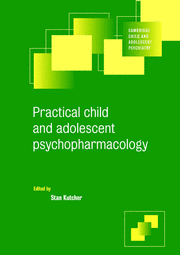Book contents
- Frontmatter
- Contents
- List of contributors
- Preface and acknowledgements
- 1 Child and adolescent psychopharmacology at the turn of the millennium
- 2 Developmental psychopharmacology
- 3 Clinical aspects of child and adolescent psychopharmacology
- 4 Depression
- 5 Bipolar mood disorders: diagnosis, etiology, and treatment
- 6 Schizophrenia and related psychoses
- 7 Obsessive–compulsive disorder
- 8 Anxiety disorders
- 9 Attention-deficit/hyperactivity disorder
- 10 Pervasive development disorder
- 11 Aggressive behavior
- 12 Adolescent substance use disorder
- 13 Tic disorders and Tourette's syndrome
- 14 Eating disorders and related disturbances
- 15 Medical psychiatric conditions
- Index
11 - Aggressive behavior
Published online by Cambridge University Press: 31 August 2009
- Frontmatter
- Contents
- List of contributors
- Preface and acknowledgements
- 1 Child and adolescent psychopharmacology at the turn of the millennium
- 2 Developmental psychopharmacology
- 3 Clinical aspects of child and adolescent psychopharmacology
- 4 Depression
- 5 Bipolar mood disorders: diagnosis, etiology, and treatment
- 6 Schizophrenia and related psychoses
- 7 Obsessive–compulsive disorder
- 8 Anxiety disorders
- 9 Attention-deficit/hyperactivity disorder
- 10 Pervasive development disorder
- 11 Aggressive behavior
- 12 Adolescent substance use disorder
- 13 Tic disorders and Tourette's syndrome
- 14 Eating disorders and related disturbances
- 15 Medical psychiatric conditions
- Index
Summary
Aggression and violence are often not precisely defined, and their study is complicated as a result. Moreover, there is no consensus definition, and many qualifiers occur in the literature including affective, instrumental, impulsive, reactive, and environmental aggression. Rippon (2000) recently reviewed definitions of aggression and identified some constants: intent on the part of the aggressor, an act (physical or verbal, active or passive, direct or indirect), and resultant physical or psychologic harm. The psychopharmacology of aggression in humans typically focuses on physical, active, and direct aggressive acts.
Broadly defined, aggression is a significant problem in child psychiatry, with some studies showing that aggression, conduct problems, and antisocial behavior account for one-third to one-half of all child and adolescent psychiatric clinic referrals (Kazdin, 1987). In some special populations – for example, persons with mental retardation or traumatic brain injury – the percentage may be even higher (King et al., 1994).
The treatment of aggression in children with medications is also complex (Connor and Steingard, 1996; Stewart et al., 1990). Of the many issues involved, two stand out in bold relief. The first issue is that aggression as a symptom is seen in the context of a variety of psychiatric diagnoses. These include disruptive behavior disorders like Attention-deficient/hyperactivity disorder (ADHD), conduct disorder (CD), and oppositional defiant disorder (ODD). Aggression can also occur in post-traumatic stress disorder (PTSD), psychotic disorders, mood disorders, seizure disorder, pervasive developmental disorders, mental retardation, and traumatic brain injuries (Fava, 1997).
Keywords
- Type
- Chapter
- Information
- Practical Child and Adolescent Psychopharmacology , pp. 305 - 327Publisher: Cambridge University PressPrint publication year: 2002
- 3
- Cited by



